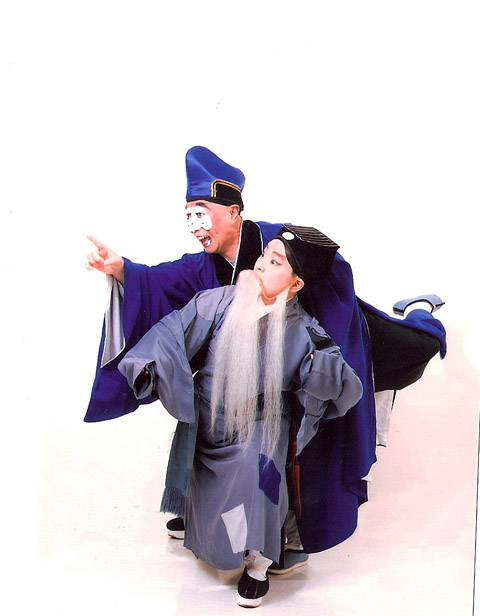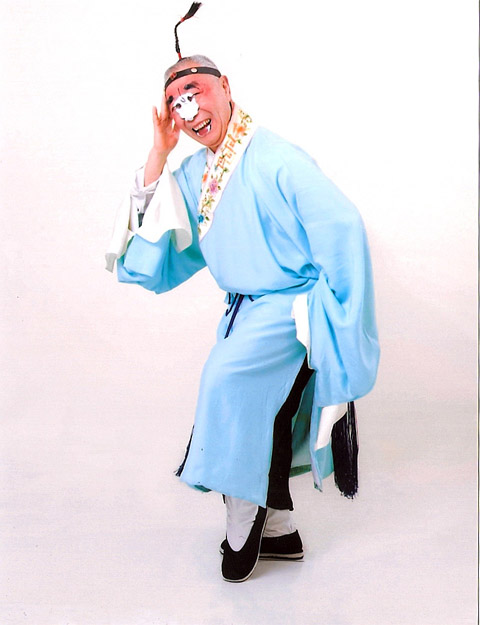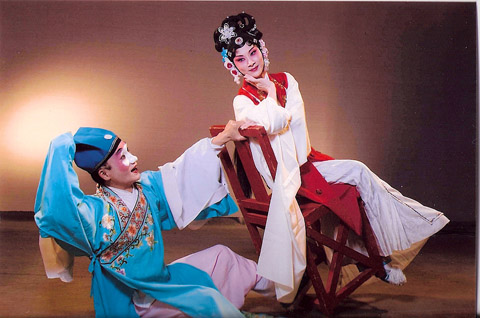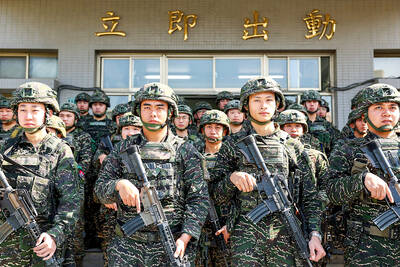Operatic stars from China visiting Taiwan are no longer a rarity, but in the relatively small world of kun opera, or kunqu (崑曲), the chance to see the older generation of practitioners on stage is still something to look forward to. This weekend, three established figures from the Shanghai Kun Opera Troupe (上海崑劇團) will be visiting Taipei for a series of performances including complete productions of The Story of the Jade Hairpin (玉簪記) and The Flower Queen and the Oil Vendor (占花魁), as part of the celebrations for the National Central University’s (國立中央大學) 30th anniversary.
The university, which over the last decade has established itself as a major center of research in traditional drama under the leadership of Chinese Department chairman Hung Wei-chu (洪惟助), is at the center of a revival of kun opera studies and performance and has worked closely with the kun opera community in China to revive an art form that had become nearly extinct by the beginning of the 20th century, superseded by more flamboyant operatic styles such as the ubiquitous Beijing opera.
Kun opera, one of the oldest surviving forms of Chinese opera, is by far the most poetic, with many of the texts being enjoyed as literature even by people who have not had the chance to appreciate the operas in performance. “It is very important that we combine the academic and performance elements in the revival of kun,” Hung said in an interview with the Taipei Times. “Performers usually did their own thing, while academics would look only to the past.”

PHOTO COURTESY OF TAIWAN KUNQU OPERA THEATER
Wei is one of the founders of the Taiwan Kunqu Opera Theater (台灣崑曲劇團), which, when established in 1991, was Taiwan’s first professional kun opera performance company. He is currently leading the way for the creation of a graduate school of traditional theater at the National Central University as a further step toward realizing his vision of combining rigorous research with the practicalities of commercial performance for Chinese opera. “Most university drama departments in Taiwan are focused on studying Western theater,” he noted.
On this occasion, the Shanghai Kun Opera Troupe’s Yue Meiti (岳美緹), Zhang Jingxian (張靜嫻) and Zhang Mingrong (張銘榮) will be joined by members of the Taiwan Kunqu Opera Theater for three performances in Taipei. The first is a program of opera highlights, including the world premiere of the Farewell at the Waystation (長亭送別) section from the 13th-century Wang Shi-fu (王實甫) version of the Western Chamber (西廂記). This section of the story was not included in later dramatic presentations, which underwent considerable revision in the 16th century. The conventional dramatic version, often referred to as the Southern Version of the Western Chamber, though performed extensively in the theater, is widely disparaged for its inferior literary standard. Hung lamented the accident of history that allowed the superior version to disappear from the theater, and was excited about this revival of elements from the original Western Chamber, which he sees as a vindication of his vision of realizing literary research in actual performance.
The performance of highlights is tonight at 7:30pm; The Story of the Jade Hairpin (玉簪記) tomorrow at 7:30pm; and The Flower Queen and the Oil Vendor on Sunday at 2:30pm. Performances at the Metropolitan Hall (城市舞台), 25, Bade Rd Sec 3, Taipei City (台北市八德路三段25號). Tickets are NT$400 to NT$1,800 and are available through NTCH ticketing.

PHOTO COURTESY OF TAIWAN KUNQU OPERA THEATER

PHOTO COURTESY OF TAIWAN KUNQU OPERA THEATER

That US assistance was a model for Taiwan’s spectacular development success was early recognized by policymakers and analysts. In a report to the US Congress for the fiscal year 1962, former President John F. Kennedy noted Taiwan’s “rapid economic growth,” was “producing a substantial net gain in living.” Kennedy had a stake in Taiwan’s achievements and the US’ official development assistance (ODA) in general: In September 1961, his entreaty to make the 1960s a “decade of development,” and an accompanying proposal for dedicated legislation to this end, had been formalized by congressional passage of the Foreign Assistance Act. Two

Despite the intense sunshine, we were hardly breaking a sweat as we cruised along the flat, dedicated bike lane, well protected from the heat by a canopy of trees. The electric assist on the bikes likely made a difference, too. Far removed from the bustle and noise of the Taichung traffic, we admired the serene rural scenery, making our way over rivers, alongside rice paddies and through pear orchards. Our route for the day covered two bike paths that connect in Fengyuan District (豐原) and are best done together. The Hou-Feng Bike Path (后豐鐵馬道) runs southward from Houli District (后里) while the

President William Lai’s (賴清德) March 13 national security speech marked a turning point. He signaled that the government was finally getting serious about a whole-of-society approach to defending the nation. The presidential office summarized his speech succinctly: “President Lai introduced 17 major strategies to respond to five major national security and united front threats Taiwan now faces: China’s threat to national sovereignty, its threats from infiltration and espionage activities targeting Taiwan’s military, its threats aimed at obscuring the national identity of the people of Taiwan, its threats from united front infiltration into Taiwanese society through cross-strait exchanges, and its threats from

March 31 to April 6 On May 13, 1950, National Taiwan University Hospital otolaryngologist Su You-peng (蘇友鵬) was summoned to the director’s office. He thought someone had complained about him practicing the violin at night, but when he entered the room, he knew something was terribly wrong. He saw several burly men who appeared to be government secret agents, and three other resident doctors: internist Hsu Chiang (許強), dermatologist Hu Pao-chen (胡寶珍) and ophthalmologist Hu Hsin-lin (胡鑫麟). They were handcuffed, herded onto two jeeps and taken to the Secrecy Bureau (保密局) for questioning. Su was still in his doctor’s robes at